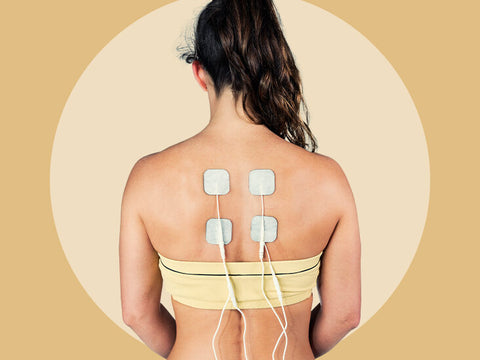
Tight muscles or muscle stiffness is when your muscles feel tight and you find it more difficult to move than you usually do, especially after rest. You may also have muscle pains, cramping, and discomfort.
Muscle stiffness usually goes away on its own. You may find relief with regular exercise and stretching. In some cases, muscle stiffness can be a sign of something more serious, especially if there are other symptoms present. Recently Transcutaneous Electrical Nerve Stimulation (TENS) unit is used to relieve the pain and avoid pain medication dependency which could lead to a more serious ailment.
Causes of Tight Muscles
Tight Muscles or muscle stiffness typically occurs after exercise, hard physical work, or lifting weights. You may also feel stiffness after periods of inactivity like when you get out of bed in the morning or get out of a chair after sitting for a long time. Sprains and strains are the most common reasons for muscle stiffness. In addition sprains and strains from the activity may cause pain, redness, swelling, bruising and limited movement. There are also other conditions that cause tightness of the muscle and these include insect bite, infection, injury from extreme heat or cold, and of course anesthesia.
Tight Muscles/ Muscle Stiffness Treatment
You may be able to treat muscle stiffness at home with rest, massage, and application of both hot and cold. Heat may work better for muscle tightness. Cold may work better for swelling and inflammation.
Stretching is important for keeping muscles flexible and preventing stiffness. To decrease muscle stiffness, improve circulation and reduce inflammation we can do regular exercise, stretch before and after exercise, warm baths, and massage on sore areas
Once the diagnosis has been made the doctor will recommend pain relievers like ibuprofen to ease pain and comfort.
A Transcutaneous Electrical Nerve Stimulation (TENS) device is a safe and effective means of temporarily relieving pain using gentle electrical impulses. The great part is you can now get temporary pain relief in the comfort of your own home. The electrical impulses can reduce the pain signals going to the spinal cord and brain, which may help relieve pain and relax muscles. They may also stimulate the production of endorphins which are the body’s natural painkillers.
How to use Transcutaneous Electrical Nerve Stimulation (TENS) for Tight Muscles
This is a general guide on how to use a TENS machine. Always follow the manufacturer's specific instructions.TENS machines are small and lightweight, so you can use them while working or on the move. You can put it in your pocket, clip it to your belt or hold it in your hand. You can use TENS throughout the day for as long as you like, although it should not be used while you're driving, operating machinery, or in the bath or shower. Make sure the machine is switched off before you attach the pads to your skin. Position the pads on either side of the painful area, at least 2.5cm (1 inch) apart.
How long does the pain relief last?
The duration of pain relief after using a TENS unit can vary. Some people report that their pain returns as soon as they switch off the device. Others continue to experience an adequate level of pain relief for up to 24 hours. A 2012 review suggests that the duration of pain relief increases after repeated TENS treatments. However, this repetition can also increase the likelihood of a person building up a tolerance to the treatment.
To help prevent muscle stiffness, try the following:
- Practice Good Posture
- Make sure that you choose comfortable home furniture
- To avoid stiffness get up walk around and move
- Eat a healthy diet
Diet to prevent tight muscle
There are a couple of things to take into consideration when it comes to preventing muscle stiffness. Make sure you stay hydrated and are getting enough of the right nutrients.
- Making sure you have enough water in your body helps your muscles work well. Many experts recommend eight 8-ounce glasses of water or other healthy drinks every day. If you are active and sweat, you should have extra water.Multiple studies have found that dehydration during exercise increases the chance of muscle damage and causes more muscle soreness. The above article concludes that dehydrated athletes have reduced muscle strength and increased fatigue perception.
- According to the National Institutes of Health (NIH), the daily recommended amount of calcium is 1,000 milligrams for young adults and 1,200 milligrams for women over 50 years and men over 70 years.
Conclusion:
One of the most convenient ways to relieve tight muscles is using a TENS machine. It is known to decrease tightness or stiffness and can be done in the comfort of your home.
References:
https://www.healthline.com/health/muscle-stiffness#dietary-factors
https://drhonow.com/en_int/blog/what-conditions-are-tens-machines-used-for
https://www.nhs.uk/conditions/transcutaneous-electrical-nerve-stimulation-tens/






